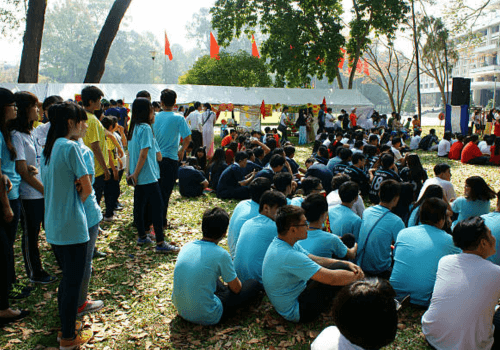10 Scholarship Interview Questions Made Easy!
August 04, 2023
Anis

Scholarship interview questions can be nerve-wracking for pre-university students.
However, it's not just limited to them, as civilian workers can also feel nervous about interviewing.
But don't worry. It's completely normal.
The key is to prepare yourself with both expected and unexpected questions.
If you're a pre-university student attending an interview, this article will provide you with ten scholarship interview questions you should familiarize yourself with.
Let's get started!
10 Scholarships Interview Questions
After applying for a scholarship, the organization responsible for awarding the scholarship may request that you attend an interview.
During the interview, you can expect to be asked open-ended questions by a representative from the organization.
These questions aim to understand better who you are and assess your eligibility for the scholarship.
Your answers to these questions are important, so prepare thoughtful and genuine responses.
1. Introduce yourself.
This query is broad and allows you to steer the discussion.
The interviewer is interested in what sets you apart from others and is looking for specific details rather than generalizations.
You can start with a general statement about yourself, then hone in on a specific point.
It is also a great chance to showcase vital and applicable skills.
2. What is your career plan?
It is essential to state your ambitions when answering this inquiry.
Explain what inspired you to pursue a particular field of study and how this scholarship can help you achieve your career objectives.
Moreover, share your post-graduation aspirations, such as in the case of engineering, and elucidate your career path and goals with the interviewer.
Elaborate on how you intend to use your certificate, your dream job, and your approach to obtaining further education and practical experience.
3. Why did you choose this program?
Showcase your enthusiasm for the university, industry, or subject. Share the aspects that are significant to you.
For example, if you wish to pursue an engineering program, mention your proficiency in hands-on exercises, ability to conduct structural analysis, and meticulousness.
4. In your opinion, why do you deserve this scholarship?
Use this question as an opportunity to showcase your true self to the interviewer.
Your application for the scholarship was made for a specific reason.
As such, honesty and sincerity in your answer are imperative.
The interviewer needs to see that you are genuinely interested in the scholarship and are not solely focused on securing additional college funding.
5. Explain your extracurricular activities.

Image source: iStock
To best answer this question, select a few extracurricular activities or organizations that are particularly meaningful to you.
Instead of simply listing them, highlight the skills you've gained through your involvement in each.
This approach will allow you to showcase your personal development and growth while providing insight into your passions and interests.
6. What is your most significant achievement?
Use this opportunity to explain a significant accomplishment or project you worked on.
Explain why it was important to you beyond the achievement itself.
7.What is your greatest strength or weakness?
When answering this question, it is vital to go beyond just listing your strengths and weaknesses.
The most effective approach is to give examples and explanations of your achievements.
For example, if you have a talent for writing, you could mention your participation in writing competitions and the awards you have received.
You may also choose to provide certificates as proof of your accomplishments.
Similarly, it is crucial to identify your weaknesses and suggest a solution.
If multitasking is challenging, you could implement a to-do list to prioritize your tasks and communicate your workload with your supervisor.
This way, they can offer you more time to complete the tasks.
Remember always to provide an example and solution for your shortcomings.
8. How did you decide on a major of study?
When discussing your major choice during an interview, it's a good idea to provide some insight into the thought process behind it.
It can include discussing your priorities, goals, interests, and the feedback you received that ultimately led to your decision.
This approach will demonstrate to the interviewer that you put careful consideration into your decision-making and made an objective choice.
9. How will you spend the scholarship funds?
Remember that scholarship committees invest in your education when you apply for a scholarship.
They want to ensure that their funds are being put to good use.
To demonstrate this, you must elaborate on your plan for utilizing the scholarship money to advance your education.
To do this effectively, research your school's attendance cost and create a budget based on your degree and credit hours.
It's also important to explain why you require additional financial assistance.
It indicates that you have carefully considered your financial requirements.
Provide precise details in your plan for using the scholarship money, including expenses such as books, fees, and other school supplies.
Lastly, if you have personal savings that you intend to use to cover your cost of living, be sure to mention this in your application.
It demonstrates to the committee that you are taking responsibility for your education and planning for your future.
10. In your opinion, how would you describe a good university?
It would be beneficial to undertake extensive research to provide a comprehensive response to the inquiry.
It is recommended that you consider significant factors such as the university's ranking, accreditation, career opportunities, and more.
If you want to know about Malaysia university ranking 2024, read here.
Doing so can ensure that your response is well-informed and valuable.
Also read: What Happens In A JPA Scholarship Interview - JKPJ Edition
6 Scholarship Interview Preparations
1. Be prepared.
Michael Jordan once said failure is acceptable, but not trying is not.
To get started, practicing introducing yourself and highlighting your accomplishments, passions, and unique experiences is essential.
Additionally, it is crucial to research the scholarship provider thoroughly, including their business nature, vision, mission, leadership, and recent news.
Sponsors are looking for candidates who demonstrate initiative by learning about their organization.
Some interviews may require you to speak on topics ranging from current events to lifestyle choices.
So, staying informed and forming opinions is crucial to reading the news.
2. Do your research.
For a better grasp of the institution or program you're interested in, head to their website and learn their history, goals, and recent updates.
If you know who will be conducting your interview, look at their professional networking profile and delve into their background to discover any common interests or connections.
Remember to review the scholarship requirements and your essay (read: the answer sheet) to reference crucial points easily.
3.Use the STAR method.
During job interviews, it is highly recommended to utilize the STAR method.
This approach entails sharing examples and providing specific, qualitative details.
STAR stands for Situation, Task, Action, and Result.
4. Dress appropriately.

Image source: iStock
When attending an interview, making an excellent first impression is crucial.
It means dressing appropriately and showing that you take the opportunity seriously.
If there is a dress code, it's essential to follow it and keep your attire moderate.
Formal or business attire typically involves a collared shirt, dark-colored slacks, or a knee-length skirt.
It's best to avoid wearing jeans or anything too flashy.
Remember, your goal is to show respect to the interviewer and make a positive impression.
5. Be punctual (or earlier).

Image source: iStock
It's better to avoid being late for an interview as it can create a negative impression about your character and time management skills.
Planning your commute carefully is recommended to prevent this, considering the possible delays and traffic issues.
It's always advisable to arrive at least 15 minutes early for the interview, which gives you ample time to locate the interview room.
In case of unforeseen circumstances, inform the interviewer about your situation so they don't have to wait for you.
These simple tips can help you make a positive impression during your interview.
6. No nail-biting, even you're nervous.
When being interviewed, displaying a poised and composed demeanor is important, even if you're feeling anxious.
Refrain from fidgeting, nail-biting, or bouncing your leg up and down.
When conversing with the interviewer, make sure to maintain eye contact.
Answer questions confidently and clearly, avoiding unnecessary "uhms" and "ahhs."
Most importantly, be truthful.
Interviewers look for authenticity, so don't pretend to be a scout troop leader when you haven't attended a camp.
While it's important to highlight your accomplishments, being deceitful is never a good idea.
We wish you good luck for your upcoming scholarship interview.
If you are searching for a Malaysia university or major course, you can visit here. Or, you want to know more insightful information? Visit our article site now!
Kickstart your education in Malaysia
We'll help you find and apply for your dream university
You might be interested in...
- What to Do After IGCSE/O-Level? Best Study Pathways in Malaysia
- Why AI in Education Matters?
- EdUHK Wins Grand Prize at iCAN 2024 Achieves the Best Performance among Hong Kong Universities
- Sunway University Ranked Malaysia's No. 1 Private University in 2025
- A Sunway University Student's Journey from Cerebral Palsy to Graduation
- APU Dominates the 2024 Private Education Excellence Awards with Dual Wins
- The Young & the Wired: How Youth are Redefining the Digital Era?
- Promoting Inclusivity at Malaysian Universities: Tips for Malaysian and International Students
- Taking IELTS test in Malaysia: Tips, Tricks, and Key Info
- Sunway University Tops Times Higher (THE) Rankings in Malaysia
 +60142521561
+60142521561





